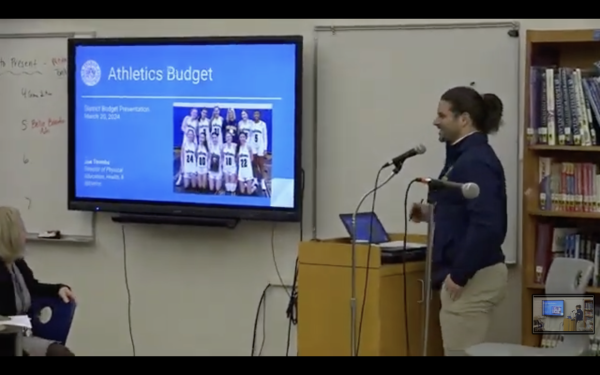Alessandra Biaggi tells Huguenot Youth Group state senate campaign like ‘flying a plane while still building it’
From left, State Sen.-elect Alessandra Biaggi, Pelham Examiner staff reporter Stella Winter and Huguenot Associate Pastor Jacob Bolton.
State Sen.-elect Alessandra Biaggi told the Huguenot Memorial Church Youth Group her improbable run to victory “was like flying a plane while still building it. You start before you’re ready.”
There were at least 10 times she felt like giving up, she said at a meeting of the youth group Monday night. “It felt like I was under attack all the time.”
Biaggi talked about her life as a child in Pelham and her career in politics before pursuing the state state senate seat in a primary battle with incumbent Democrat Jeff Klein. She went to Prospect Hill School, Pelham Middle School and Pelham Memorial High School. Biaggi said she found great joy being in many after-school activities such as We Care and cheerleading and even sleeping on the field one cold, winter night. She said that night on the field helped her have empathy for people.
After graduating from PMHS, she went to New York University and Fordham Law School—after being rejected three times. She worked on Hillary Clinton’s campaign and was a lawyer in Gov. Mario Cuomo’s office, where realized how many “boundaries and barriers” there are in politics.
Biaggi became upset with how many pieces of legislation weren’t passing. “People would literally say to me, ‘Honey, this is Albany.'”
As a state senator next year, she promised an open door. “People can come and go at all times,” she said. “I work for you, nobody else. It’s public office.”
Biaggi received a lot of encouragement from her family, but also faced a great deal of negativity when she announced her candidacy. “They were telling me it wasn’t my turn,” she said. “Get in line”
Having local groups such as Progressive Women of Pelham and Indivisible supporting her early almost wasn’t enough to win. It was only in late July and August when people really began to take Biaggi seriously, she said. She was endorsed by key politicians, including U.S. Rep.-elect Alexandria Ocasio-Cortez, New York City Council Speaker Corey Johnson and Sen. Kirsten Gillibrand, among others.
Biaggi was asked if she was ever friendly with her opponent. She responded that she and Klein actually had few interactions, and that when they did occasionally meet it, it was usually at something tense like a debate.
At one debate where they had to share a microphone, Biaggi said, “I leaned over and asked him, ‘Is this your worst nightmare?'” But she also said that she made sure that whenever they debated, she made her comments about policies, not personal issues.
Speaking about the current political climate, Biaggi said that she doesn’t believe in fighting fire with fire, or as she put it, fighting darkness with darkness. She said that she doesn’t admire the fact that some people are so hostile towards each other. “It takes a lot to just say ‘don’t speak to me that way.'”
She said if she ran again, she would be healthier while doing so. Biaggi said that this time she didn’t work out or meditate as much as she thought she should have. “I’d take care of myself more.”
She said that whenever she started to compare herself to people she wasn’t even running against or who were on her team, her fiancée would tell her to “compete against yourself.”
The state senator-elect was asked if she would ever run for president. She replied that she didn’t know what the future held for her, but that anything was possible.
Biaggi took on the state Democratic Party establishment by challenging a sitting candidate in the primary. She said people told her, “‘How dare you. You’ll never get another job in state government again.’ It has nothing to do with you.”
Biaggi said that a friend had framed a quote from President Theodore Roosevelt for her: “It is not the critic who counts; not the man who points out how the strong man stumbles, or where the doer of deeds could have done them better. The credit belongs to the man who is actually in the arena, whose face is marred by dust and sweat and blood; who strives valiantly; who errs, who comes short again and again, because there is no effort without error and shortcoming.”
“You are in charge of your own destiny in life,” she said.
Stella Winter is a seventh grader at Pelham Middle School. This is her second year writing for the Pelham Examiner and her fourth year writing for a...















